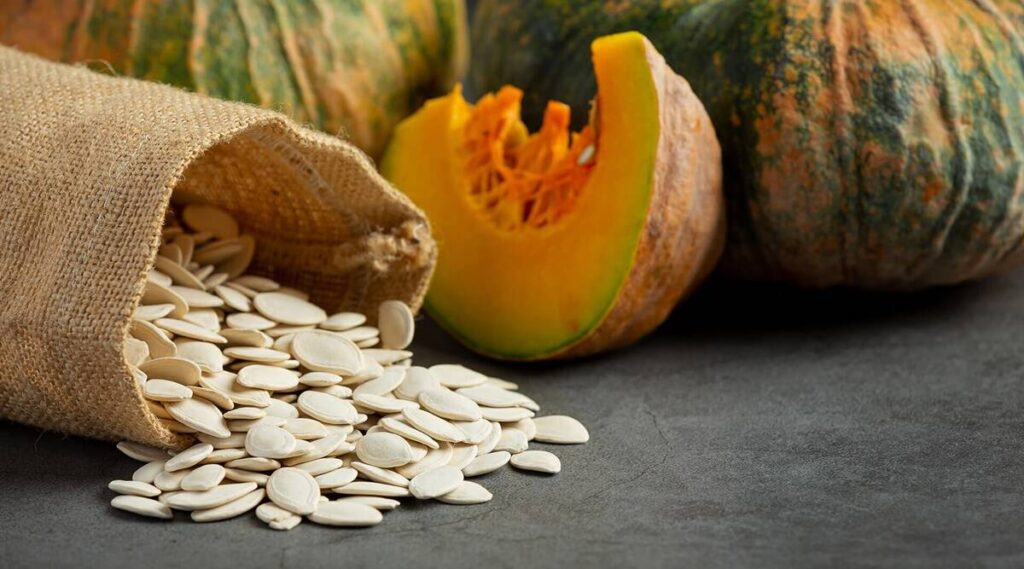
A storehouse of wonderful micronutrients, pumpkin seeds are excellent in managing diabetes, improved fertility, better heart health, and enhanced blood sugar control.
Pumpkin seeds are highly nutritious and are associated with health benefits, including improved fertility, better heart health, and enhanced blood sugar control.
By Dr. Chitalu Chilufya.
Lusaka, Oct. 7 – Pumpkin seeds are the tiny superfood the world is embracing due to their amazing nutrient profile and health benefits. They may be small, but they’re packed full of valuable nutrients. Eating only a small amount of them can provide you with a substantial quantity of healthy fats, magnesium, and zinc.
Also Read: Don’t throw away watermelon seeds.
Because of this, pumpkin seeds have been associated with several health benefits, including improved heart health and protection against certain cancers. They’re also a good source of antioxidants and may support prostate health.
What’s more, these seeds can be easily incorporated into your diet. Here, then, are the top science based health benefits of pumpkin seeds that should make you look for them today!
1. High in antioxidants:
Pumpkin seeds are rich in antioxidants like flavonoids and phenolic acids. They also contain small amounts of vitamin E and carotenoids.
Antioxidants can reduce inflammation and protect your cells from harmful free radicals. For this reason, consuming foods rich in antioxidants can help protect against many diseases.
It’s thought that the high levels of antioxidants in pumpkins seeds are partly responsible for their positive effects on health.
In one older study, pumpkin seed oil reduced inflammation in rats with arthritis without side effects, whereas animals given an anti-inflammatory drug experienced adverse effects.
2. May improve sperm quality:
Low zinc levels are associated with reduced sperm quality and an increased risk of infertility in males. Since pumpkin seeds are a rich source of zinc, they may improve sperm quality.
Interestingly, evidence from one animal study found that supplementing with pumpkin seed oil and vitamin E improved sperm quality and reproductive performance in roosters.
Pumpkin seeds are also high in antioxidants and other nutrients that can contribute to healthy testosterone levels and improve overall health.
Together, all these factors may benefit fertility levels and reproductive function, especially in males.
3. Linked to a reduced risk of certain cancers:
Some research suggests that pumpkin seeds may contain plant compounds that could help protect against cancer growth.
In fact, a 2012 observational study found that eating pumpkin seeds was associated with a reduced risk of breast cancer in postmenopausal women.
Other older studies suggest that the lignans in pumpkin seeds may play a key role in preventing and treating breast cancer.
Furthermore, one test-tube study found that pumpkin seed extract had the potential to slow down the growth and spread of prostate cancer cells.
4. Improve prostate and bladder health:
Pumpkin seeds may help relieve symptoms of benign prostatic hyperplasia (BPH), a condition in which the prostate gland enlarges, causing problems with urination.
Several studies in humans found that eating these seeds reduced symptoms associated with BPH. In a 2021 study, pumpkin seed oil consumption was able to reduce symptoms and improve quality of life in 73 people with BPH.
Additionally, though pumpkin seed oil was not as effective as a prescription medication, it was associated with fewer negative side effects.
Further research suggests that taking pumpkin seeds or their products as supplements can help treat symptoms of an overactive bladder. One older study in 45 people with overactive bladders found that taking 10g of pumpkin seed oil extract daily improved urinary function.
5. Very high in magnesium:
Pumpkin seeds are one of the best natural sources of magnesium, a mineral that is often lacking in many diets of today.
Magnesium is needed for more than 600 chemical reactions in your body. Adequate levels of magnesium are also important for:
▪️ controlling blood pressure
▪️ reducing heart disease risk
▪️ forming and maintaining healthy bones
▪️ regulating blood sugar levels
6. May improve heart health:
Pumpkin seeds are a good source of antioxidants, magnesium, zinc, and unsaturated fats, all of which may help keep your heart healthy.
Human and animal studies have also shown that pumpkin seed oil may reduce blood pressure and cholesterol levels, two important risk factors for heart disease.
One older, 12-week study in 35 postmenopausal women found that pumpkin seed oil supplements reduced diastolic blood pressure by 7% and increased HDL (good) cholesterol levels by 16%.
Other research suggests that pumpkins’ ability to increase nitric oxide generation in the body may be responsible for its positive effects on heart health.
Nitric oxide helps expand blood vessels, improving blood flow and reducing the risk of plaque growth in your arteries.
7. Can lower blood sugar levels:
Some older animal studies have shown that pumpkin, pumpkin seeds, pumpkin seed powder, and pumpkin juice can reduce blood sugar.
One study in healthy adults found that those who consumed meals containing 65g of pumpkin seeds had lower blood sugar levels after a high carb meal.
Interestingly, the high magnesium content of pumpkin seeds may be responsible for its positive effect on diabetes.
One large observational study found that people who consumed the highest amount of magnesium had a 15% lower risk of developing type 2 diabetes than those who consumed the lowest amount over a 28-year period.
8. May help improve sleep:
If you have trouble sleeping, you may want to eat some pumpkin seeds before bed. They’re a natural source of tryptophan, an amino acid that can help promote sleep.
According to a 2014 study, consuming at least 1g of tryptophan daily is thought to improve sleep. However, note that you would need to eat around 170g of pumpkin seeds to achieve the needed amount of tryptophan.
As we have already discussed, pumpkin seeds are an excellent source of magnesium. Adequate magnesium levels have also been associated with better sleep, according to some observational studies.
Some studies have found that taking a magnesium supplement could improve sleep quality and decrease the amount of time it takes to fall asleep in older adults with insomnia
Also Read: Kalembula is not food for the poor! – Dr. Chitalu Chilufya.
◾How to add pumpkin seeds to your diet.
Incorporating pumpkin seeds into your diet can be a tasty and nutritious way to boost overall well-being. There are several delicious ways to incorporate pumpkin seeds into your diet:
▪️ Enjoy as it is: Enjoy them as a standalone snack. Raw pumpkin seeds are crunchy and nutritious.
▪️ Roasted: Roast them with a bit of oil and your favourite spices for a flavourful snack or salad topper.
▪️ Trail mix: Mix pumpkin seeds with nuts and dried fruits for a tasty trail mix.
▪️ Yogurt topping: Sprinkle pumpkin seeds on yoghurt or oatmeal for added texture and nutrition.
▪️ Smoothie add-in: Blend them into your smoothies for a nutty flavour and an extra nutrient boost.
▪️ Baking: Incorporate pumpkin seeds into your baking recipes, such as bread or muffins.
▪️ Salad garnish: Sprinkle pumpkin seeds on salads to enhance both flavour and nutritional value.
◾The bottom line.
Pumpkin seeds are highly nutritious and packed with powerful antioxidants. Eating them can help solve dietary deficiencies and may protect against various health problems.
In fact, pumpkin seeds have been shown to improve heart health, blood sugar levels, fertility, and sleep quality. They may even protect against certain types of cancer. In addition, their rich nutrient content may provide other health benefits, such as improved energy, mood, and immune function.
What’s best, they can easily be added to your diet, allowing you to reap their many positive effects.
About The Author: Dr. Chilufya, a PF presidential candidate, is a public health physician, Mansa Central Member of Parliament and former Minister of Health who led a transformational agenda of the national health system, focused on creating a resilient health approach to achieve Universal Health Coverage.
Gain new perspectives by following Woodpecker’s Digest! To make well-informed and thoughtful decisions, one must be able to see things from perspectives other than one’s own.
©2023 Woodpecker’s Digest.
Putting news into perspective









